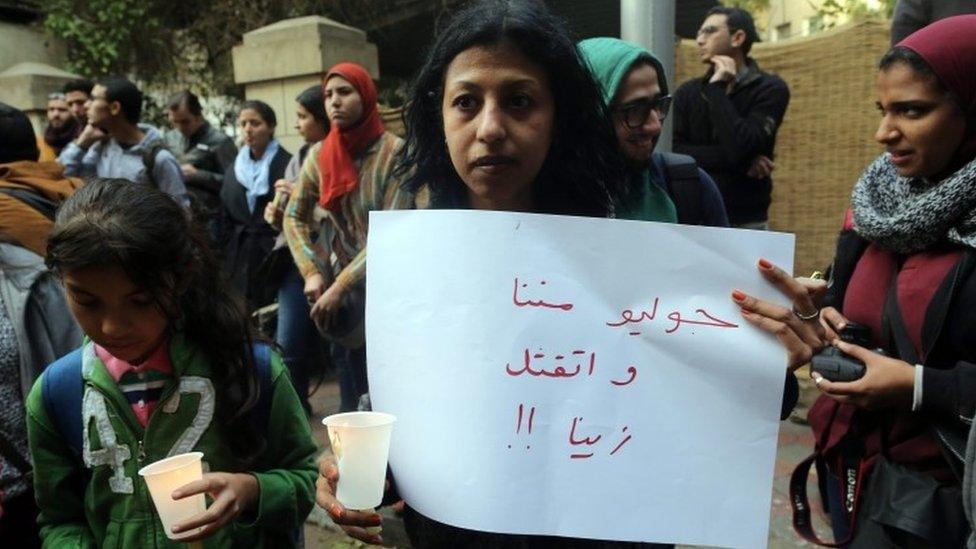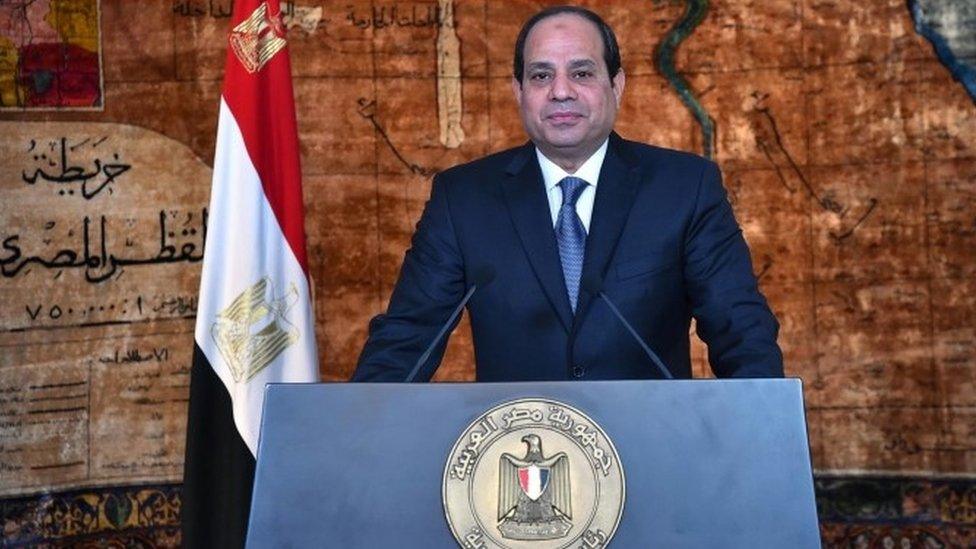Italian student's death puts Egyptian abuses back on agenda
- Published

Giulio was one of us and was killed like us, read this placard at a memorial for the Italian
The recent death in Cairo of Italian graduate student Giulio Regeni has triggered fresh concerns about Egypt's human rights situation, five years after mass protests forced President Hosni Mubarak from power.
Mr Regeni, who was in Egypt to conduct research on trade unions and labour rights, disappeared on 25 January - the fifth anniversary of the start of the protests.
More than a week later, his body was found dumped by a roadside, showing what a senior Egyptian prosecutor called "clear signs" of torture.
Amid outrage expressed on Egypt's lively online media scene, many alleged police involvement in the death.
Egypt's official media denied it and the authorities dismissed the accusations as rumours and lies.
But for many Egyptians, Mr Regeni's case stands out only because the victim was a foreign national.
IS threat
Human rights groups have documented many alleged abuses since the then head of the armed forces, now President Abdul Fattah al-Sisi overthrew Egypt's first democratically elected leader, Mohammed Morsi of the Muslim Brotherhood, in 2013.
A security clampdown by President Sisi initially targeted Brotherhood members and sympathisers, but rights activists now say no one who opposes the government is safe.
Interior Minister Magdi Abdel Ghaffar has repeatedly denied reports of "forced disappearances" and torture in police custody.
He says stringent security measures are necessary because of the threat to national security from the so-called Islamic State (IS) group.

President Sisi gave a televised address on the eve of the fifth anniversary of protests
Rights groups say hundreds of people who have nothing to do with either IS or the banned Muslim Brotherhood have faced abuse including torture, sexual assault, arbitrary arrest, disappearances, prolonged detention, disproportionately harsh sentences, unfair trials and death in custody, external.
Many students, journalists, academics and secular-leaning activists hailed as heroes of the 2011 uprising are now in prison.
Rights groups also accuse the government, external of "harassing and prosecuting independent lawyers and judges who advocate the reform of the anti-torture legislation".
Of 340 people logged by the Egyptian Commission for Rights and Freedoms as having disappeared between August and November last year, five were found dead, one with signs of torture. Most of the rest ended up in jail.
The group has reported 35 disappearances so far in 2016. Two of the disappeared have turned up dead.
'Bruised and broken'
Those known to have been detained in recent months include the journalist Hossam Bahgat, who was released after international protests. Many lesser known figures remain behind bars.
One disappearance involved Islam Atitu, an engineering student at Ain Shams University in Cairo, who was last seen in May 2015 being escorted from an exam hall by two men. The next day, his body was found in a deserted area east of Cairo.
The Interior Ministry accused Mr Atitu of being a terrorist who had killed a police officer, saying he was shot in an exchange of fire with security forces at a hideout in the desert, having been the first to open fire.
Mr Atitu's mother appeared in a video, external, in which she is seen weeping outside the morgue, saying her son's body was "bruised" and his arms had been "broken".

President Sisi faces genuine security challenges, as the bombing of a Russian plane in Sinai last year showed
President Sisi's growing number of critics in Egypt say his security measures include too much settling of scores against supporters of the 2011 protests and not enough action on the country's real problems.
The government faces a genuine security challenge, not least from Islamist militants in the Sinai peninsula, but it is steadily alienating the public with police actions perceived to be brutal and arbitrary.
And then there is the economy, suffering from a lack of foreign investment and prolonged tourism downturn.
Critics say the Sisi administration - largely dependent on financial support from the Gulf - has had little to offer on either big issue, beyond vague promises and warnings about the danger of turning into Syria or Libya.
Some critics suggest harsh security responses may stem from concern in the presidential palace that a leader declining in popularity could face a repeat of the anti-Mubarak uprising.
But many observers believe mass protests are unlikely in the foreseeable future, because of widespread fatigue with instability, and fears - looking across the region - that what comes next could be even worse.
So while Italy continues to press Cairo for answers about what happened to Mr Regeni, the best many Egyptians can hope for is that international pressure on their government does not stop when the news cameras inevitably move on.